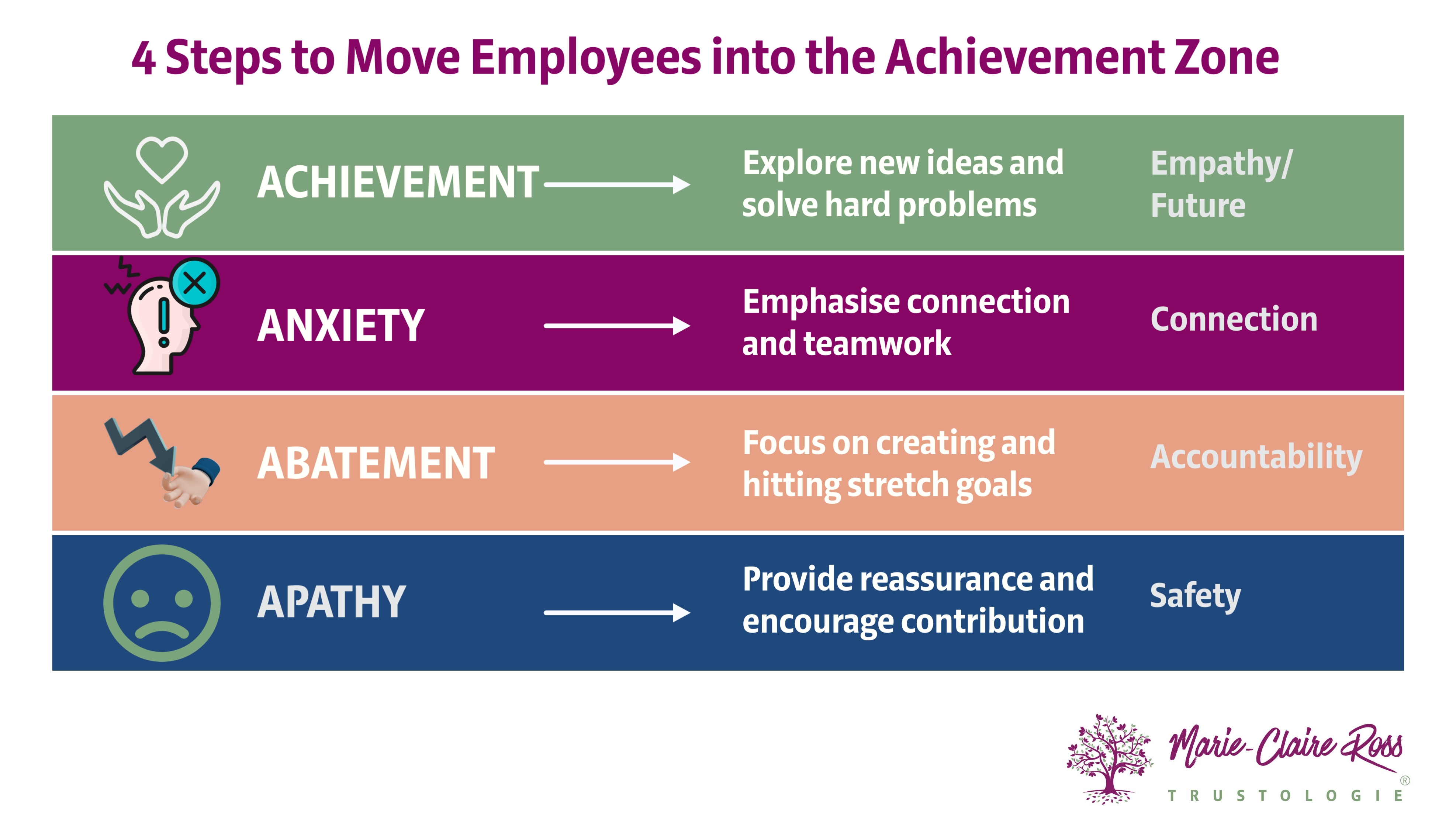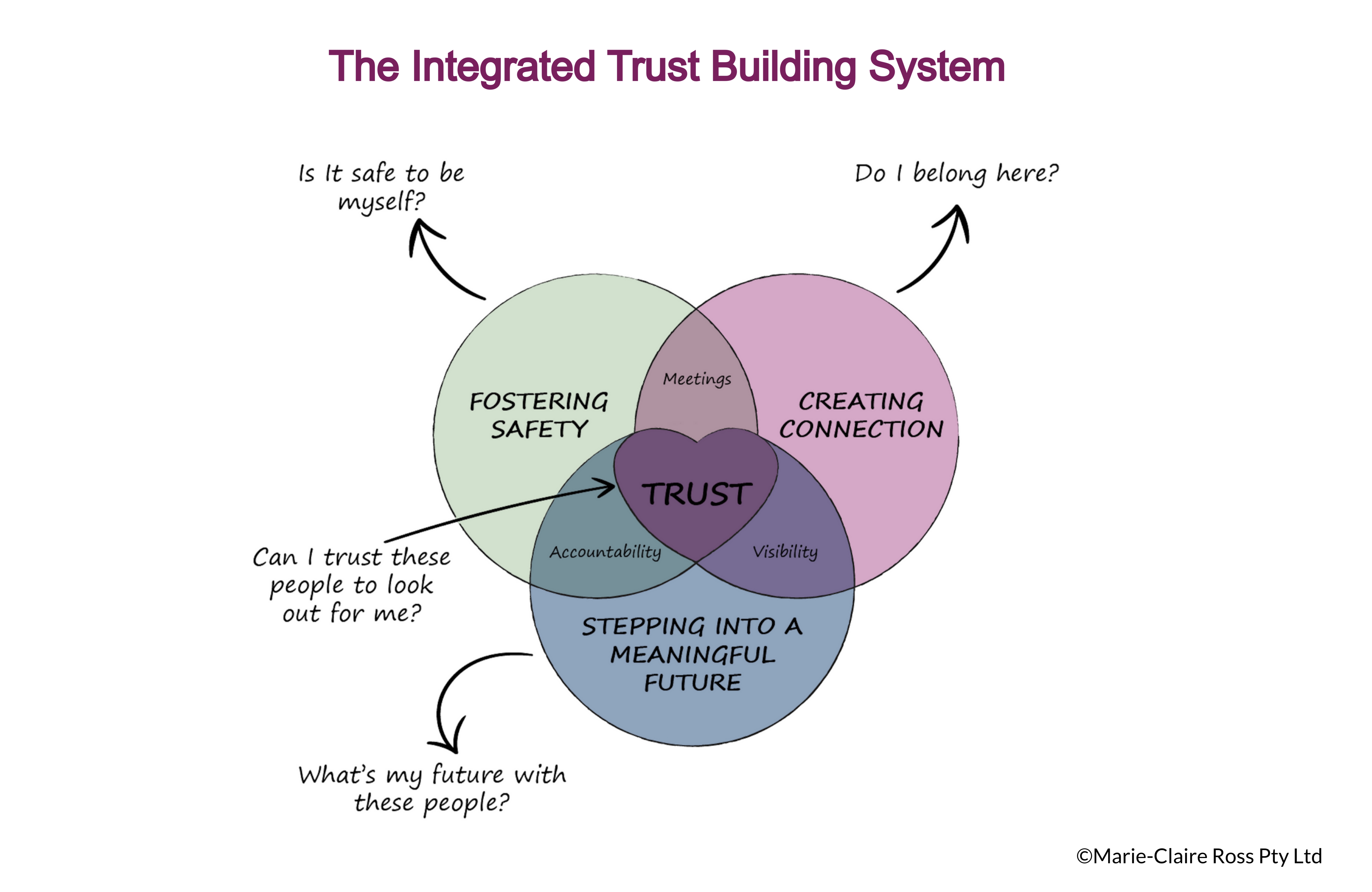11 min read
4 Practical Strategies for Better Emotional Management in the Workplace
I have a friend who often finds herself at the mercy of her emotions. Recently, she called me to rehash a confrontation she’d had with a group of...
Develop leaders, strengthen executive teams and gain deep insights with assessments designed to accelerate trust and performance.

Transform how your leaders think and perform with keynotes that spark connection, trust and high-performance cultures.

Explore practical tools, thought-leadership and resources to help you build trusted, high-performing teams.

Trustologie® is a leadership development consultancy founded by Marie-Claire Ross, specialising in helping executives and managers build high-trust, high-performing teams.

3 min read
Marie-Claire Ross : March 15, 2022

One of the things that I strongly believe in, that I mention in my book, Trusted to Thrive, is how leaders make a huge difference in making people feel better about themselves.
As a leader, your job is to create an environment where people work together in service of a shared goal – a high achievement environment where people wake up in the morning excited about going to work and hanging out with others equally excited by the opportunity to learn, experiment and solve complex problems. And it's a proven way to get results - highly engaged teams show 21% greater profitability.
But not only that, employees who love their job and feel valued improve society. They go home happy which means they treat their family members, friends, strangers and pets better. And they are healthier. All in all, It creates a powerful ripple effect on society.
Leaders today really need to have the skills to create a safe environment where motivated people can flourish and manage their psychology.
As human beings we are so fearful of other people hurting us that we don’t realise how much we hold back from speaking up and committing our full selves to perform at our best.
When our boss gives us a grumpy greeting in the morning, we assume we have done something wrong. We second guess what it meant, running through all sorts of negative scenarios as to what we could possibly have done wrong.
That’s where leaders make a difference – through their energy and focus to create a healthy, high trust, positive team culture. A great team leader helps those around them make sense of their lives through goals, purpose and action. They foster a thriving, connected, accepting workplace that gently coaxes people out of their protective shells to gleefully join in with others, leaving their fears and self-doubt behind.
As Mihali Csikszentmihalyi said in his acclaimed book Flow, the worst moods people report are when they’re alone and nothing needs to be done. We need external goals, stimulation and feedback. When external input is lacking, attention begins to wander and thoughts become chaotic.
A team that trusts one another, and their leader, creates magical team coherence. That wonderful space where you are all in flow, moving as one, reading each other's intent and body language. Just like a group of professional dancers effortlessly moving in harmony, in tune to the rhythm of a song.
It creates a buzz, a hum, an energy that we crave. It's a place where we thrive as human beings, where we feel energised and empowered, connected and aligned through shared identity and purpose. We feel valued, creative and safe to share our opinion. It's a place where we feel all is possible - that we're in this together and that the hard work is worth it.
In my belief, creating a trusted environment enables everyone to be accountable for achieving results together as a team. Everyone can rely on each other to deliver and be treated respectfully even when they make a mistake.
You know someone is not a good fit on your team when they don't truly support others. During a crisis or looming deadline, they leave early, leaving their peers to sort out issues. Even worse is when they make bogus excuses for not delivering or get angry when questioned about behaviours or deliverables. The truth is such a co-worker hasn't fully subscribed to the need to be trusted by others. It can be devastating to team results - teammates can't rely on them to get things done well or be someone they can ask for advice when things get tough.
There are lots of great books on trust. Where Trusted to Thrive differs is that other books talk about the behaviours that leaders need to improve. These lists can be really long - in my mind fixing 13 behaviours is difficult for anyone, including leaders who are under pressure to perform in limited time.
Trusted to Thrive is really about making sure everyone is trusted - both employees and leaders. And gives leaders the tools to encourage their direct reports to work to a higher standard that benefits everyone.
Every relationship is a social contract between one or more people. Each person is responsible for the functioning of the team. In our society, the onus is on the leader. It is time that employees learnt to be responsible for their actions or inaction, as well. And this takes a leader to encourage them to work and behave at a higher level. Helping employees understand that they also need to be accountable, visible and communicate what's going on. A central tenet of my Integrated Trust Building System.
100.png?width=2835&name=The%20Integrated%20Trust%20Building%20System%20(colour)100.png)
In this model, there are three communication practices that we need to communicate both verbally and non-verbally to help people trust the situation - that they are safe, connected and have a future in the team. These practices are communicated in three different interactions- during meetings or one-on-ones, when we are working or sharing information (visibility) and when being or asking for accountability.
Leaders who work on their own self-awareness and that of their direct reports work towards creating trusting and ethical workplaces. Our lack of self-awareness and self-reflection on our behaviours can create an enormous disconnect between what we say and do. One of the underlying concepts of trust.
The good news is that these three practices don't take much time to deliver, it just takes practise and courage. And when you get them right, they provide a powerful shortcut to navigating the complexity of humans behaviours and beliefs. You can be assured if someone isn't working out, it's more likely that they are not the right fit. They do not have the characteristics or behaviours to lift their performance in an environment that is supportive and rewarding.
If you want more tips on how to improve the self-awareness of you and your team and encourage everyone to work in a trusted team culture, pick up your copy of Trusted to Thrive.

11 min read
I have a friend who often finds herself at the mercy of her emotions. Recently, she called me to rehash a confrontation she’d had with a group of...

9 min read
True leadership presence isn’t a performance or a set of charisma hacks; it is the felt experience of who you are being in the room. By cultivating...

13 min read
As teams return from their summer (or winter) break, you may notice subtle shifts in your team’s energy. Even if the end of year was positive, a new...

There comes a time in every team, when the energy seems to dip.

“Organisations learn only through individuals who learn.” Peter Senge, MIT

Most leaders understand the importance of building trust in their teams and across them. Yet, throw in a bit of risk or uncertainty and leaders...